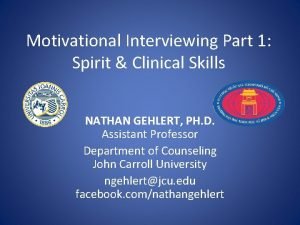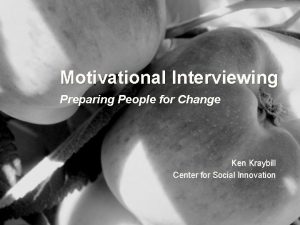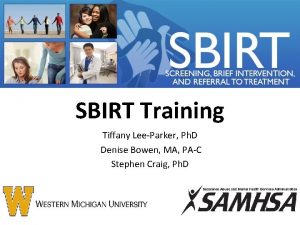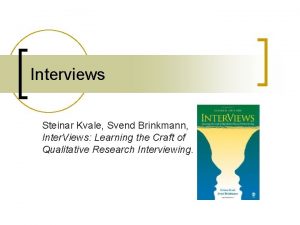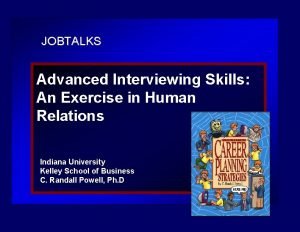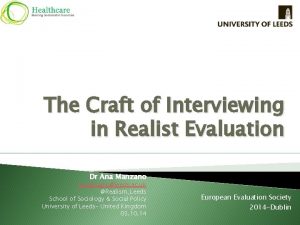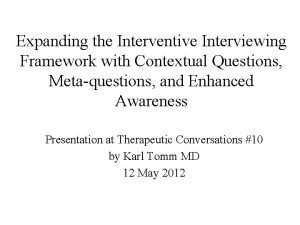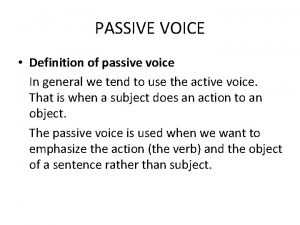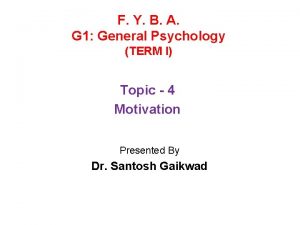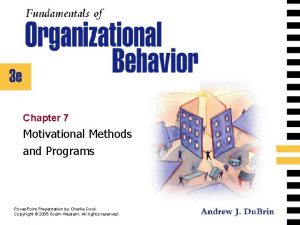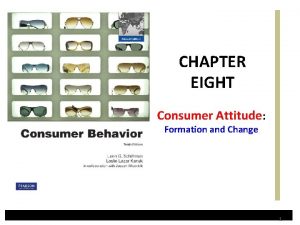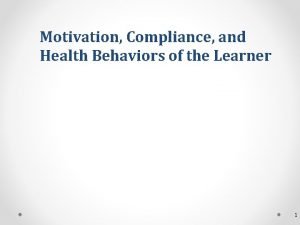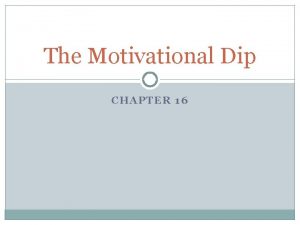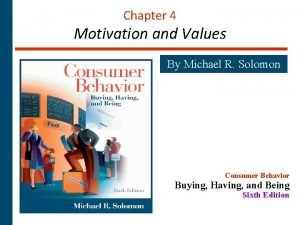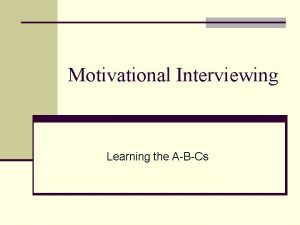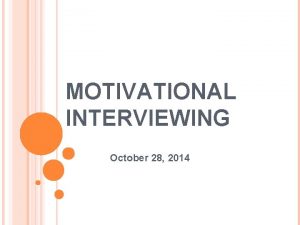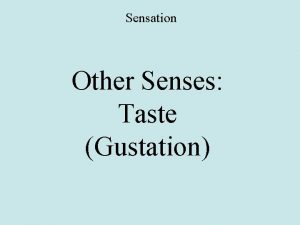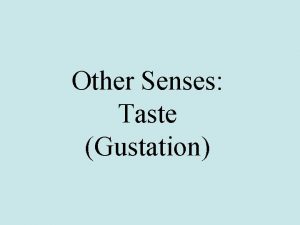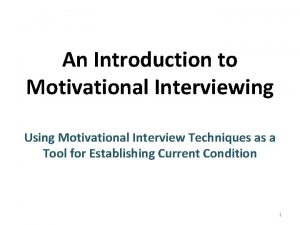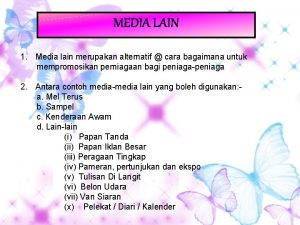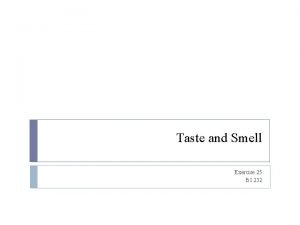A TASTE OF MOTIVATIONAL INTERVIEWING Michael Mc Lain




























































- Slides: 60

A TASTE OF MOTIVATIONAL INTERVIEWING Michael Mc. Lain Director Outpatient Services Phoenix Center, Greenville SC

A taste of MI A Taste of MI 2017 2

A taste of MI - Round 1 The Client: Role play a client presenting for services, where there is a clear behavior change goal (finding work, better nutrition, parenting skills, etc. )You are ambivalent and somewhat resistant to change. A Taste of MI 2017 3

A taste of MI - Round 1 Support Group Leader • Explain why the client should make this change. • Give at least three specific benefits that would result from making the change. • Tell the client how to change. • Emphasize how important it is for the client to change, and • Tell the client to do it. A Taste of MI 2017 4

Process Role Play A Taste of MI 2017 5

Compassionate Conversation A Taste of MI 2017 6

MI Relational Style Empathic Warm & friendly Collaborative Accepting Respectful Optimistic Eliciting & Listening Honoring of autonomy & choice A Taste of MI 2017 7

Empathy is not: § Having had the same experience or problem § Identification with the client § Empathy is: § The ability to accurately understand the client’s meaning § The ability to reflect that accurate understanding back to the client Let me tell you my story A Taste of MI 2017 8

A Taste of MI 2017 9

What most people really need is a good listening to. ~Mary Lou Casey A Taste of MI 2017 10

Motivational Interviewing Motivational interviewing is a person-centered, evidencebased, goal-oriented method for enhancing intrinsic motivation to change by exploring and resolving ambivalence with the individual. Motivational Interviewing 3 rd Ed. Miller and Rollnick, (2012) A Taste of MI 2017 11

Collaboration Compassion MI Spirit Acceptance Evocation A Taste of MI 2017 12

Four Fundamental Processes of MI Planning Evoking Focusing Engaging A Taste of MI 2017 13

The processes are somewhat linear…… Engaging necessarily comes first Focusing (identifying a change goal) is a prerequisite for Evoking Planning is logically a later step Engage - Shall we walk together? Focus - Where? Evoke - Why? Plan A Taste of MI 2017 How? 14

Clinical Roadmap ENGAGING: Open the Conversation • • • Provide Clinical Feedback Explain role State appointment length Ask permission • Use visual support materials • Be clear, succinct, and non- FOCUSING: Negotiate the Agenda judgmental • Compare to norms and standards • Elicit Participant's interpretation EVOKING: Build Motivation • Ask evocative questions • Encourage elaboration • Looking back/Looking forward • Explore/Amplify ambivalence • Explore goals and values • Assess importance/confidence Support the Transition: • Recognizing readiness • Summarizing the big picture • Ask about next steps PLANNING: Strengthening Commitment • Brainstorm ideas and opinions • Negotiate a plan • Explore barriers • Identify support • Elicit final commitment Elicit Provide Elicit • • • Education Advice Feedback Skills Referral Close the Encounter: • Summarize the session • Show appreciation • Support self-efficacy • Arrange follow-up as appropriate • Link with available resources A Taste of MI 2017 15

Motivational Interviewing Assumes motivation is fluid and can be influenced Motivation influenced in the context of a relationship – developed in the context of a patient encounter Principle tasks – to work with ambivalence and resistance Goal – to influence change in the direction of health A Taste of MI 2017 16

AMBIVALENCE IS. . A Taste of MI 2017 17

Motivational Interviewing UNDERLYING ASSUMPTIONS Acceptance/Potential for Growth Autonomy/Choice Elicit versus Impart Ambivalence is normal Care-frontation Unconditional positive regard Change talk Righting reflex A Taste of MI 2017 18

Common Reactions to Righting Reflex Angry, agitated Afraid Oppositional Helpless, overwhelmed Discounting Ashamed Defensive Trapped Justifying Disengaged Not understood Not come back – avoid Not heard Uncomfortable Procrastinate A Taste of MI 2017 19

To avoid this… LET GO!!! A Taste of MI 2017 20

Common Human Reactions to Being Listened to Understood Want to talk more Safe Liking the worker Empowered Open Hopeful Accepted Comfortable Respected Interested Engaged Want to come back Able to change Cooperative A Taste of MI 2017 21

O – Open questions A – Affirmations R – Reflections S – Summaries A Taste of MI 2017

Closed Questions sound like… “Do you…Are you… Did you… Could you…Have you…? ” “Did you get a job yet? ” “Do you care about finishing your studies? ” “Did you think before you did that? ” “Do you have a drinking problem? ” A Taste of MI 2017 23

Open-Ended Questions sound like… “What…. Which…. Where… How… Tell me…” “How does it feel to be back at work? ” ü “Where do you think your biggest challenge lies? ” ü “What do you think you’ll take care of first? ” ü “Tell me about your relationship with your boss/partner/daughter” ü A Taste of MI 2017 24 24

Affirmations… • Affirmations are sincere, specific and immediate. • Affirmations are not cheerleading. A Taste of MI 2017 25

Affirmations Emphasize a strength Notice and appreciate a positive action Should be genuine Build feelings of empowerment Instill hope and “can-do” attitude Express positive regard and caring Strengthen the clinical relationship A Taste of MI 2017 26

Affirmations Commenting positively on an attribute § A statement of appreciation § Thanks for coming in today! A compliment § I appreciate your openness and honesty today. Catch the person doing something right § You’re a strong person, a real survivor. I like the way you said that. An expression of hope, caring, or support § A Taste well of MI 2017 I hope this weekend goes for you! 27

Reflections A Taste of MI 2017 28

How to Form a Reflection 1. You can reflect the patient’s… • speech, • facial expressions, • behavior 2. Make a guess about the deeper meaning (therapeutic hunch)

Reflective Listening § § A hypothesis (guess) about speaker’s meaning A statement to convey understanding Intonation down Short stems – “So…” – “Sounds like…” – “So you…” – “Seems like …” – “Its like…” – “You feel…” A Taste of MI 2017 30 30

Simple (stabilizing) Repeating (repeats an element of what the client said) Rephrasing (uses new words) Complex (forward moving) Paraphrasing (makes a guess to unspoken meaning) Reflection of feeling (deepest form; a paraphrase that emphasizes the emotional dimension through feeling statements) A Taste of MI 2017 31

What I’m hearing is… So you’re saying that… You’re feeling like… So you…. Almost as if… Sounds as if you… For you, it’s a matter of…. From your point of view, … I’m hearing that you… I’m really getting that you… I get the impression that you… A Taste of MI 2017 32

Simple Reflection Example Simple Reflection Client: “This whole thing has been so confusing. ” Counselor: “It’s confusing…” A Taste of MI 2017 33

Complex Reflection: Example Complex Reflection Client: “You’re not from around here. What do you know? ” Counselor: “You’re worried that I might not understand you. ” A Taste of MI 2017 34

Double-Sided Reflection “So one hand, you are afraid if you quit drinking you will be bored and lose your friends. . But on other side, if you don’t, you are faced with losing your wife and family…. . ” Role Play Exercise A Taste of MI 2017 35

The summary is like a bouquet of flowers that we give to the client. A Taste of MI 2017 36

Summary § Set up Bookend: § “Let me see if I have this right…” § “Let me summarize what you’ve said…” § Reflection, Reflection § Follow up Bookend: § “So where does that leave you? § “What else would you like to add? ” § “Now, tell me about …. ” § “Tell me more about…” A Taste of MI 2017 37 37

Summaries Can… § Give the message that the patient is being heard § Allow the patient to add important information § Shift the direction of the interview § Facilitate and guide § Reflect ambivalence § Accentuate “change talk” A Taste of MI 2017 38 38

Fundamental Belief The capacity and potential for change and adherence is within every person! A Taste of MI 2017 39

Change and Sustain Talk A Taste of MI 2017 40

Change talk is like gold! • As Participants speak about change, they begin to see the possibilities • No pressure or persuasion is needed A Taste of MI 2017 41

Types of Change Talk: • Desire I want to…. I’d really like to… I wish… • Ability I would… • Reason There are good reasons to… • Need I can…. I am able to. . . I could… This is important…. I really need to… • Commitment • Activation • Taking Steps I intend to… I will… I plan to… I’m ready… I’m able I completed my class assignment on time A Taste of MI 2017

Eliciting Change Talk What concerns you about your drinking/smoking/health habit? What are others worried about regarding your drinking/smoking/health pattern? What relevance/importance does smoking/drinking have in your personal goals? If you decided to change your drinking/smoking/health habit, how would that change your life? Your family’s life? A Taste of MI 2017 43

DARN CATs A Taste of MI 2017 44

What is Resistance? DISCORD CHANGE TALK SUSTAIN TALK A Taste of MI 2017 45

Sustain Talk and Discord Sustain Talk is about the target behavior § I really don’t want to quit smoking § I need my pills to make it through the day Discord is about your relationship § You can’t make me quit § You don’t understand how hard it is for me Both are highly responsive to practitioner style A Taste of MI 2017 46

Ambivalence / Resistance It sounds like the pros of using still far outweigh the cons for you. So it may be that you decide drinking is something that you don’t want to give up despite the consequences Sometimes, by siding with the client, it causes them to step back and move more towards our desired behavior. A Taste of MI 2017 47

Change-talk Eliciting Strategies Decisional Balance § Ambivalence is a normal part of the change process § Use ambivalence to promote positive change § Weigh pros and cons of behavior § Increase discrepancy A Taste MI 2017 A Taste of MIof 2016 48

DECISIONAL BALANCE SHEET 1. Good things: 2. Not so good things: A Taste of MI 2017

Importance/Confidence/Readiness Rulers 0 1 2 3 4 5 6 A Taste of MI 2017 7 8 9 10 50

Negotiate a plan of action • Invite active participation by the patient • Patient determines goals & priorities • Patient weighs options • Together, work out details of the plan A Taste of MI 2017 51

Giving Information and Advice: 3 Kinds of Permission 1. The participant asks for advice 2. You ask permission to give advice 3. You qualify your advice to emphasize autonomy MI Core Skills 2015 5252

Finalizing the motivational interview Review the commitment Review the plan Set up a new time to meet/follow up Express encouragement A Taste of MI 2017 53

A taste of MI - Round 2 The Client: Talk about something about yourself that you want to change / need to change / should change / have been thinking about changing etc. , but haven't changed yet (i. e. , something you're ambivalent about. ) A Taste of MI 2017 54

A taste of MI - Round 2 cont’d Worker: Listen carefully with a goal of understanding the dilemma. Give no advice. Ask these four questions: 1. Why would you want to make this change? 2. How might you go about it, in order to succeed? 3. What are three best reasons to do it? 4. On a scale from 0 to 10, how important would you say it is for you to make this change? Give a short summary/reflection of the speaker's motivations for change. Summarize what they said about Desire for change, Ability to change, Reasons for change, Need for change. Then ask, "So what do you think you'll do? " and just listen with interest. A Taste of MI 2017 55

Giving Advice / Information Always ask for permission “Other clients have found ___ to be of help. Are you interested in knowing about that or is there something we should discuss first? ” Offer alternatives (menu of options) “We could give you a list of local resources or set up a session with a treatment provider. ” Provide more information according to the interest of the patient “Would you like to know more about AA? ” Express concern when indicated “Would it be all right if I tell you one concern I have about this plan? ” A Taste of MI 2017 56

Strength: Commitment Language HIGH § I will / promise / swear / guarantee § I intend to / agree to / am ready to § I plan / expect / resolve / aim to § I hope to / will try to / will see about /I guess / think / suppose I will LOW A Taste of MI 2017 57

Closing our Encounter Extend gratitude Support autonomy Offer advice Voice confidence A Taste of MI 2017 58

The MI Shift From feeling responsible for changing clients’ behavior to supporting them in thinking & talking about their own reasons and means for behavior change. A Taste of MI 2017 59

Thank you! Michael Mc. Lain mmclain@phoenixcenter. org 864 -467 -3769 A Taste of MI 2017 60
 Cris cannon
Cris cannon Motivational interviewing traps
Motivational interviewing traps Motivational interviewing
Motivational interviewing German motivational speech
German motivational speech Motivational interviewing
Motivational interviewing Motivational interviewing
Motivational interviewing Mi readiness ruler
Mi readiness ruler Dares motivational interviewing
Dares motivational interviewing Motivational interviewing dears
Motivational interviewing dears Motivational interviewing wiki
Motivational interviewing wiki Agreement with a twist motivational interviewing
Agreement with a twist motivational interviewing Motivational interviewing
Motivational interviewing Dears motivational interviewing
Dears motivational interviewing Darn cat motivational interviewing
Darn cat motivational interviewing Motivational interviewing
Motivational interviewing Active listening motivational interviewing
Active listening motivational interviewing Motivational interviewing ears
Motivational interviewing ears Sbirt faith and spirituality
Sbirt faith and spirituality Ken kraybill
Ken kraybill Motivational interviewing schizophrenia
Motivational interviewing schizophrenia Agenda mapping bubble sheet
Agenda mapping bubble sheet Darn cat motivational interviewing
Darn cat motivational interviewing Change talk worksheet
Change talk worksheet Nimi singh
Nimi singh Rolling with resistance meaning
Rolling with resistance meaning Darn cat motivational interviewing
Darn cat motivational interviewing Agreement with a twist motivational interviewing
Agreement with a twist motivational interviewing Michael phelps motivational video
Michael phelps motivational video Nakanunara
Nakanunara Belanja lain lain
Belanja lain lain Istilah lain dari sistem informasi manufaktur
Istilah lain dari sistem informasi manufaktur Interviewing techniques definition
Interviewing techniques definition Sample performance monitoring and coaching for teachers
Sample performance monitoring and coaching for teachers Chapter 7 interviewing candidates
Chapter 7 interviewing candidates Interviewing techniques journalism
Interviewing techniques journalism Kvale seven stages of interviewing
Kvale seven stages of interviewing Intensive interviewing
Intensive interviewing Advanced interviewing techniques
Advanced interviewing techniques Hawthorne experiments were conducted by
Hawthorne experiments were conducted by Performance based interviewing
Performance based interviewing Components of social case work pdf
Components of social case work pdf Karl tomm interventive interviewing
Karl tomm interventive interviewing The craft of interviewing in realist evaluation
The craft of interviewing in realist evaluation Karl tomm interventive interviewing
Karl tomm interventive interviewing Interviewing techniques in nursing
Interviewing techniques in nursing Interviewing in action in a multicultural world
Interviewing in action in a multicultural world The girl drove the blue car
The girl drove the blue car Chapter 7 interviewing candidates
Chapter 7 interviewing candidates Motivational cycle
Motivational cycle Incentive to act
Incentive to act Social psychology by david myers
Social psychology by david myers Site:slidetodoc.com
Site:slidetodoc.com Motivational pathway
Motivational pathway Changing the basic motivational function
Changing the basic motivational function Motivational climate definition
Motivational climate definition Elton mayo motivation theory
Elton mayo motivation theory Cover letter for learnership
Cover letter for learnership Work sales contests
Work sales contests Compliance motivation and health behaviors of the learner
Compliance motivation and health behaviors of the learner Motivational dip
Motivational dip Motivational conflicts marketing
Motivational conflicts marketing




